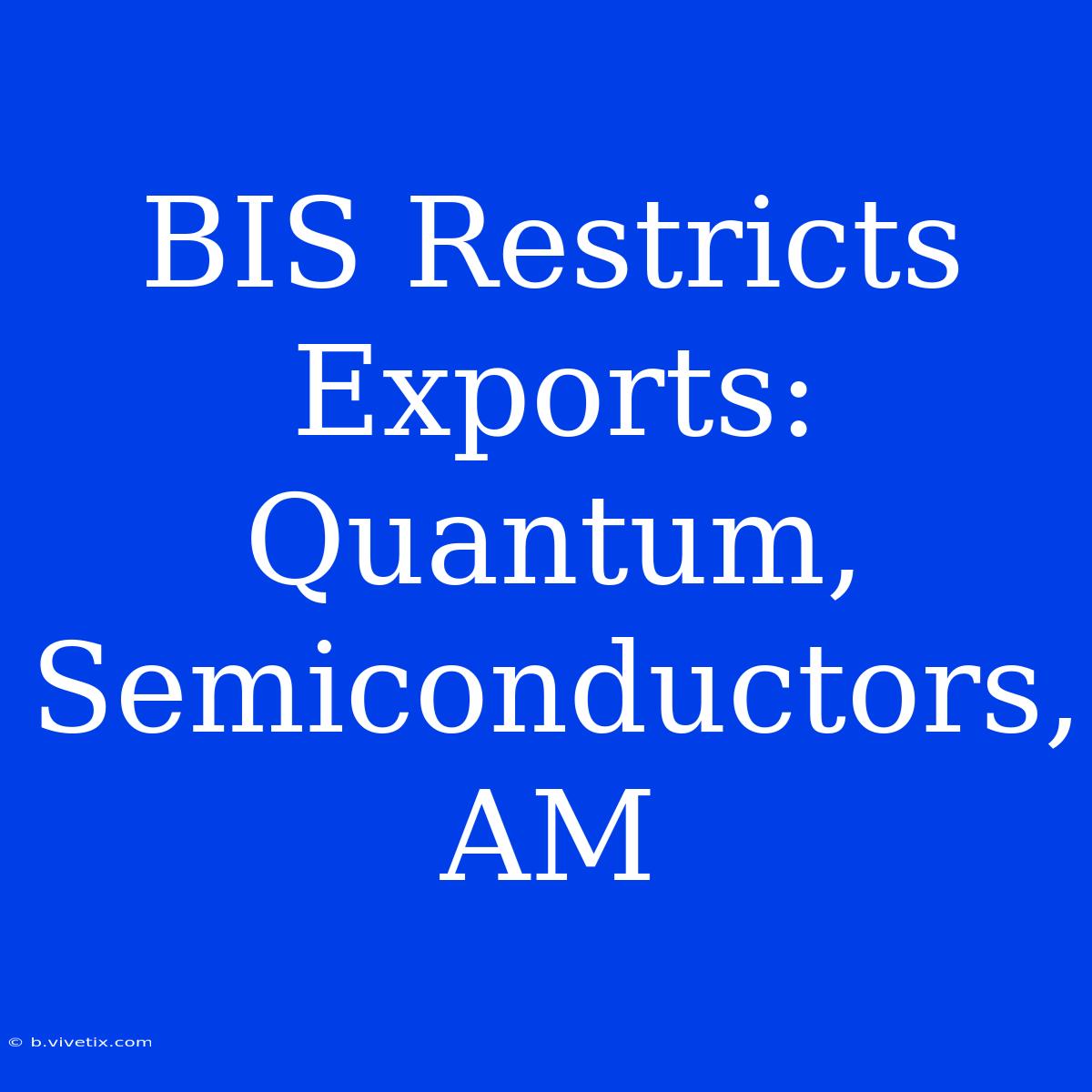BIS Restricts Exports: Quantum, Semiconductors, AM - Understanding the Implications
Is the Bureau of Industry and Security (BIS) tightening the reins on export controls? The answer is a resounding yes, particularly when it comes to advanced technologies like quantum computing, semiconductors, and additive manufacturing (AM). This shift has significant implications for businesses and researchers operating in these fields. Let's explore the reasons behind these restrictions and their potential impact.
**Editor Note: ** BIS's recent actions highlight the increasing geopolitical significance of these technologies and the desire to maintain a technological edge. Understanding these new regulations is crucial for businesses involved in these industries to ensure compliance and navigate the evolving landscape.
This article delves into the BIS's latest restrictions, analyzing their purpose, scope, and potential consequences. It explores the challenges they present for companies operating in these fields and offers insights into potential strategies for navigating these new realities. We'll cover key aspects such as:
- The BIS's Rationale: What drives these restrictions?
- Scope of Restrictions: Which technologies are affected?
- Impact on Businesses: What are the potential consequences for companies?
- Navigating the New Landscape: How can businesses adapt?
The BIS's Rationale
The BIS's rationale behind these restrictions is rooted in the belief that certain technologies, particularly those with dual-use capabilities, pose a risk to national security and foreign policy objectives. Quantum computing, semiconductors, and AM, due to their potential applications in defense, intelligence, and other critical sectors, fall under this category.
Scope of Restrictions
The BIS's restrictions encompass a broad range of technologies. These include:
- Quantum computing: This includes hardware, software, and algorithms for quantum computers, potentially impacting research and development efforts.
- Semiconductors: Specific types of semiconductors, particularly those with advanced capabilities, are subject to export controls, potentially impacting supply chains and manufacturing.
- Additive manufacturing: Advanced 3D printing technologies with applications in aerospace, defense, and other high-tech industries are under scrutiny, impacting equipment and material exports.
Impact on Businesses
These restrictions pose several challenges for businesses operating in these sectors:
- Increased compliance burden: Companies must navigate complex regulations and licensing requirements, leading to higher compliance costs and potentially hindering business operations.
- Supply chain disruption: Restrictions on the export of critical components can disrupt supply chains, affecting production schedules and potentially increasing costs.
- Limited market access: Restrictions can limit access to certain markets, reducing potential business opportunities and hindering growth.
Navigating the New Landscape
Businesses need to adopt a proactive approach to navigate these changes:
- Stay informed: Monitoring BIS regulations and updates is crucial to ensure compliance and understand potential implications for operations.
- Seek legal advice: Engaging legal experts specialized in export controls can provide guidance and minimize potential legal risks.
- Diversify supply chains: Exploring alternative suppliers and sourcing options can mitigate the impact of restrictions on critical components.
- Invest in research and development: Focusing on indigenous development of technologies and capabilities can reduce reliance on restricted imports.
Key Takeaways
| Aspect | Description |
|---|---|
| BIS's Rationale | National security and foreign policy concerns |
| Scope of Restrictions | Quantum computing, semiconductors, and AM |
| Impact on Businesses | Increased compliance burden, supply chain disruption, limited market access |
| Navigating the New Landscape | Stay informed, seek legal advice, diversify supply chains, invest in research and development |
Understanding the BIS's restrictions on exports is essential for businesses operating in the quantum, semiconductor, and AM sectors. By proactively adapting to these changes, companies can mitigate risks, ensure compliance, and remain competitive in a constantly evolving landscape.
FAQ
Q: What are the specific types of semiconductors that are subject to export controls?
A: The BIS often specifies certain types of semiconductors based on their technical capabilities and potential applications. This can include semiconductors with advanced lithography, specific materials, or functionalities deemed sensitive for national security reasons.
Q: How can businesses determine if their products are subject to export controls?
A: Businesses should consult the BIS's Export Administration Regulations (EAR) and engage with legal experts specializing in export control compliance. The EAR provides detailed classifications of controlled items and outlines export licensing requirements.
Q: What are the potential consequences for businesses that violate export control regulations?
A: Violations can lead to severe penalties, including fines, imprisonment, and revocation of export privileges. It is essential for businesses to comply with all applicable regulations.
Tips for Navigating the New Landscape
- Develop a comprehensive export control compliance program: This should include a robust system for identifying and classifying controlled items, obtaining necessary licenses, and maintaining accurate records.
- Conduct regular export control training for employees: Educate employees about the importance of export control compliance and equip them with the knowledge to make informed decisions.
- Engage with export control experts: Consult with legal experts specializing in export controls to ensure compliance and minimize potential legal risks.
Summary
The BIS's recent restrictions on the export of quantum, semiconductor, and AM technologies reflect the increasing importance of these industries in the global landscape. Businesses operating in these sectors must adapt to these changes by ensuring compliance, diversifying supply chains, and investing in research and development. Proactive steps are crucial to navigate this complex landscape and maintain competitiveness in a rapidly evolving global economy.
Closing Message
The future of technological innovation lies in balancing the need for global collaboration with the imperative of protecting national security. As the BIS tightens restrictions, businesses need to navigate these complex regulations to ensure their continued growth and contribute to a responsible and secure technological future.

